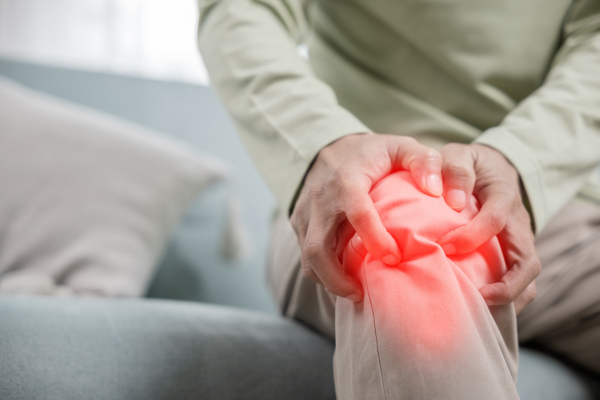If you think pain pills are the answer to your joint pain, think again.
For years, doctors have handed out prescriptions as if they’re the magic bullet for aching knees and stiff joints.
But at what cost?
The side effects, the dependency, the long-term damage—it’s time to face the truth.
There’s a better way.
The best supplement for joint pain isn’t just a safer option; it’s a smarter, more natural solution that tackles the root cause of your discomfort.
If you’re tired of the risks, discover how supplements for knee pain can bring real relief without the dangerous baggage of painkillers.

The Problem with Pain Pills
Pain pills are often the go-to solution for joint pain, but not all painkillers are created equal.
Over-the-counter options like NSAIDs (nonsteroidal anti-inflammatory drugs) such as ibuprofen and aspirin are commonly used to ease inflammation and pain.
On the other hand, prescription painkillers, including opioids like oxycodone or hydrocodone, are reserved for more severe cases.
While NSAIDs are easier to access, opioids are potent and come with a higher risk of side effects and dependency.
Both types, however, only mask the pain without addressing the underlying issue—leaving users dependent and at risk for serious health problems.
Common Side Effects and Risks
Pain pills, whether over-the-counter or prescription, can come with a host of side effects.
NSAIDs, for example, are notorious for causing gastrointestinal issues, such as ulcers, heartburn, and even internal bleeding if used long-term.
Prescription opioids bring their own set of dangers, including nausea, constipation, and a very real risk of dependency.
Moreover, both classes of drugs can take a significant toll on liver function, particularly when used frequently or in high doses.
For many people, the short-term relief isn’t worth the long-term damage.
Long-Term Health Concerns
The longer you rely on pain pills, the greater the potential harm to your body.
Prolonged NSAID use can increase your risk of cardiovascular events, such as heart attacks and strokes, making them a dangerous choice for those with existing heart issues.
Kidney damage is another significant concern, as NSAIDs can reduce blood flow to the kidneys, impairing their function over time.
Opioids, while effective for pain management, carry an even heavier burden—the potential for addiction.
What starts as a prescription for acute pain can quickly turn into a dependency that’s difficult, if not impossible, to break.
In the long run, pain pills may solve one problem while creating many others.

Why Supplements Are the Safer Alternative
Unlike synthetic pain pills, the best supplements for joint pain are made from natural ingredients that work with your body, not against it.
Turmeric, for example, is a popular ingredient known for its potent anti-inflammatory properties, thanks to the compound curcumin.
Glucosamine and chondroitin are other well-known supplements that help maintain joint cartilage and reduce the progression of joint deterioration.
These natural compounds not only support joint health but also come with fewer side effects compared to pharmaceuticals, offering a more balanced and sustainable approach to pain relief.
Targeting the Root Cause, Not Just Symptoms
Pain pills are essentially a quick fix, masking the pain without addressing what’s really going on inside your body.
Supplements, however, take a different approach.
They target the root causes of joint discomfort—such as inflammation and cartilage breakdown—rather than merely numbing the symptoms.
Ingredients like glucosamine and chondroitin work to repair and maintain cartilage, while omega-3 fatty acids and turmeric help reduce chronic inflammation.
By focusing on rebuilding joint health and reducing the underlying causes of pain, these supplements provide long-term relief that doesn’t rely on merely hiding the discomfort.
Safety Profile of Common Joint Health Supplements
The safety profile of joint health supplements is another key factor that sets them apart from traditional painkillers.
Unlike NSAIDs and opioids, which come with a long list of potential health risks, supplements tend to be much gentler on the body.
There are no risks of gastrointestinal bleeding, liver damage, or addiction when using glucosamine, chondroitin, or turmeric as directed.
Most side effects, if any, are mild—like digestive upset—and can often be avoided by taking supplements with food.
This makes supplements a safer, longer-term option for managing joint pain without the fear of severe, life-altering side effects.

Effective Supplements for Joint Pain Relief
When it comes to natural joint pain relief, certain supplements have shown exceptional effectiveness due to their unique properties.
Let’s explore some of the best ingredients for promoting joint health and reducing pain.
Pycnogenol® (Pine Bark Extract)
Pycnogenol®, derived from French maritime pine bark, is a powerful antioxidant that helps reduce inflammation—a key contributor to joint pain.
Studies have shown that Pycnogenol® can significantly reduce symptoms of osteoarthritis, helping improve joint function and comfort without the harsh side effects of traditional painkillers. [1]
Harpagophytum procumbens (Devil’s Claw)
Devil’s Claw has been used for centuries as a natural remedy for joint pain.
This herb is particularly effective in reducing inflammation and improving mobility, making it an excellent choice for those suffering from arthritis or general joint discomfort.
It works by inhibiting inflammatory pathways, helping to alleviate pain naturally. [2]
MSM (Methylsulfonylmethane)
MSM is a sulfur-containing compound that plays an important role in joint health by reducing inflammation and oxidative stress.
It also supports collagen production, which is essential for maintaining the structure and elasticity of joints.
MSM has been shown to help reduce stiffness, improve mobility, and enhance the overall quality of life for those with joint issues. [3]
Glucosamine
Glucosamine is a well-known supplement that helps maintain the integrity of cartilage, the tissue that cushions joints.
It’s particularly useful for individuals with osteoarthritis, as it may slow down the progression of joint degeneration.
By supporting cartilage repair and reducing inflammation, glucosamine can provide lasting relief from joint pain. [4]
White Willow Bark Extract
White Willow Bark is often considered nature’s aspirin due to its salicin content, which helps reduce pain and inflammation.
Unlike synthetic pain pills, White Willow Bark provides gentle relief without the gastrointestinal issues commonly associated with NSAIDs.
It’s a great natural option for those looking to manage joint pain without harsh side effects. [5]
Zinc and Copper
Zinc and copper are essential minerals that play a crucial role in maintaining joint health.
Zinc helps with tissue repair, while copper is important for the formation of collagen, which keeps joints and connective tissues strong.
Together, these minerals work to protect joints from damage and support overall mobility. [6]
Magnesium
Magnesium is a vital mineral that plays a role in muscle and nerve function, which in turn can help alleviate joint pain.
It also has anti-inflammatory properties and aids in muscle relaxation, reducing the stiffness often associated with joint issues.
Many people are deficient in magnesium, and supplementing can help improve both joint and muscle function. [7]
Pyridoxine (Vitamin B6)
Vitamin B6 is essential for reducing inflammation and supporting overall joint health.
It helps regulate homocysteine levels, which, when elevated, can contribute to joint damage and pain.
By maintaining healthy levels of homocysteine, Vitamin B6 plays an indirect but important role in keeping joints pain-free and functional. [8]

Want Real Joint Pain Relief? It’s Time to Ditch the Pain Pills
Relying solely on pain pills for joint pain relief can be a risky path.
From gastrointestinal issues and liver damage to potential addiction, the side effects of traditional painkillers are significant and often outweigh the temporary relief they provide.
Pain pills may mask the symptoms, but they do nothing to address the root causes of joint pain, leaving you with a cycle of dependency and increased health risks over time.
Natural supplements, on the other hand, offer a safer, more sustainable solution.
By targeting inflammation, supporting cartilage repair, and using ingredients that work with your body, these supplements provide effective relief without the harsh side effects of pharmaceuticals.
If you’re ready to take control of your joint health, consider incorporating natural supplements into your routine—your joints will thank you.
References
Rheumatology
S. Chrubasik, S. Pollak, A. Black, Effectiveness of devil's claw for osteoarthritis, Rheumatology, Volume 41, Issue 11, November 2002, Pages 1332–1333, https://doi.org/10.1093/rheumatology/41.11.1332
Nutrients
Toguchi A, Noguchi N, Kanno T, Yamada A. Methylsulfonylmethane Improves Knee Quality of Life in Participants with Mild Knee Pain: A Randomized, Double-Blind, Placebo-Controlled Trial. Nutrients. 2023 Jun 30;15(13):2995. doi: 10.3390/nu15132995. PMID: 37447322; PMCID: PMC10346176.
Journal of Orthopaedic Surgery and Research
Zhu X, Sang L, Wu D, Rong J, Jiang L. Effectiveness and safety of glucosamine and chondroitin for the treatment of osteoarthritis: a meta-analysis of randomized controlled trials. J Orthop Surg Res. 2018 Jul 6;13(1):170. doi: 10.1186/s13018-018-0871-5. PMID: 29980200; PMCID: PMC6035477.
Life
Lin CR, Tsai SHL, Wang C, Lee CL, Hung SW, Ting YT, Hung YC. Willow Bark (Salix spp.) Used for Pain Relief in Arthritis: A Meta-Analysis of Randomized Controlled Trials. Life (Basel). 2023 Oct 14;13(10):2058. doi: 10.3390/life13102058. PMID: 37895439; PMCID: PMC10607963.
BMC Musculoskeletal Disorders
He, H., Wang, Y., Yang, Z. et al. Association between serum zinc and copper concentrations and copper/zinc ratio with the prevalence of knee chondrocalcinosis: a cross-sectional study. BMC Musculoskelet Disord 21, 97 (2020). https://doi.org/10.1186/s12891-020-3121-z.
Nutrition Research
Kuang X, Chiou J, Lo K, Wen C. Magnesium in joint health and osteoarthritis. Nutr Res. 2021 Jun;90:24-35. doi: 10.1016/j.nutres.2021.03.002. Epub 2021 Apr 1. PMID: 34023805.
BMC Musculoskeletal Disorders
Ghavidel-Parsa, B., Naeimi, A., Gharibpoor, F. et al. Effect of vitamin B6 on pain, disease severity, and psychological profile of fibromyalgia patients; a randomized, double-blinded clinical trial. BMC Musculoskelet Disord 23, 664 (2022). https://doi.org/10.1186/s12891-022-05637-7.

